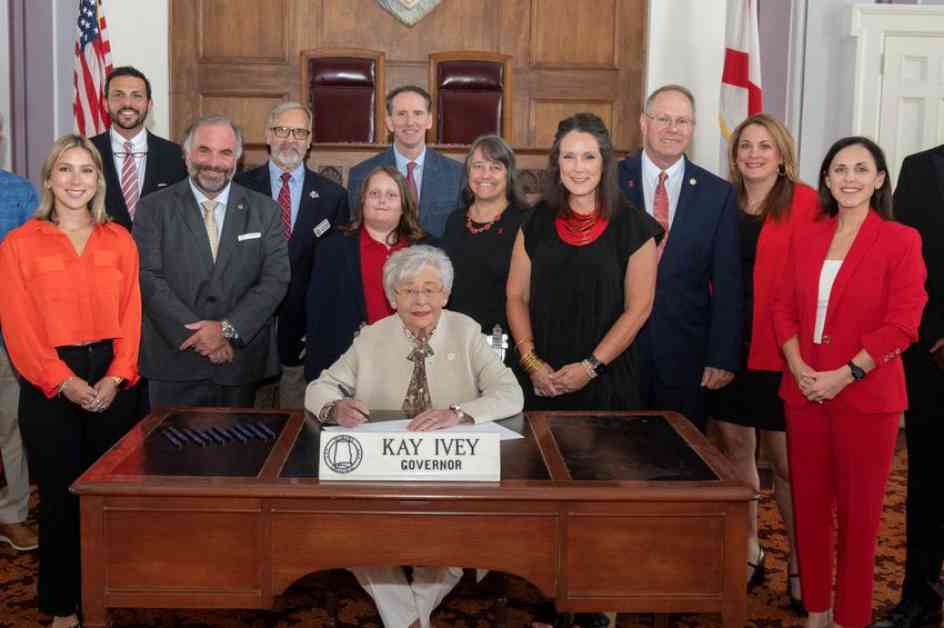Alabama Governor Kay Ivey recently signed the John Wesley Foster Act into law, marking a significant step towards ensuring cardiac safety in schools across the state. This groundbreaking legislation mandates that all public schools must have a cardiac emergency response plan (CERP) in place to guide individuals on how to respond in the event of a cardiac emergency. The plan includes instructions to dial 911, initiate CPR, and utilize an automated external defibrillator (AED) on campus and at school-sponsored athletic events.
The American Heart Association, in collaboration with You’re the Cure advocates and other organizations in Alabama, played a pivotal role in advocating for this important policy change. By pushing for the implementation of the John Wesley Foster Act, these groups aim to increase survival rates for individuals who experience cardiac arrests outside of a hospital setting.
The act is named in honor of John Wesley Foster, a young boy from Gadsen, Alabama, who tragically passed away after suffering cardiac arrest at the age of 9 in November 2006. John Wesley’s mother, Heather Amberson, who is a nurse, emphasized the importance of CPR training and swift action in the event of a cardiac emergency. She expressed her hope that the new legislation will empower schools to save the lives of students, parents, teachers, and other visitors.
Statistics show that approximately 23,000 children under the age of 18 experience cardiac arrest outside of a hospital each year in the United States, with around 40% of these cases being sports-related. Whether in the classroom or on the field, having a well-defined plan in place for responding to cardiac emergencies can significantly increase survival rates. In schools equipped with AEDs, approximately 70% of children survive cardiac arrest – a rate that is seven times higher than the overall survival rate for children.
Representative Ed Oliver, the bill’s sponsor, emphasized the importance of prioritizing the health and safety of Alabama students. He stated that the John Wesley Foster Act ensures that schools have the necessary training and resources to respond effectively to cardiac events. By providing schools and communities with immediate access to AEDs and individuals trained in CPR, the legislation aims to minimize risks and enhance the overall safety and well-being of students and community members.
According to national data, more than 356,000 individuals experience cardiac arrest outside of a hospital in the United States each year, with only 10% of them surviving. Immediate CPR can significantly improve a person’s chances of survival, potentially doubling or even tripling their likelihood of making a full recovery.
Fire Chief Cory D. Moon of the Birmingham Fire and Rescue Service, who also serves as a board member of the American Heart Association, commended the efforts of Representative Ed Oliver and the Alabama Legislature in passing the John Wesley Foster Act. He highlighted the positive impact that the legislation will have on increasing survival rates for students, school staff, and visitors experiencing cardiac arrest.
For individuals seeking more information on CERP or CPR/AED training, the American Heart Association offers valuable resources and guidance on their website, heart.org. The organization is committed to promoting longer, healthier lives for all individuals and communities, and encourages collaboration with various stakeholders to advance equitable health initiatives.
As the American Heart Association celebrates its centennial year in 2024, the organization remains dedicated to funding innovative research, advocating for public health, and sharing lifesaving resources. With a vision to promote health and hope for everyone, everywhere, the American Heart Association continues to be a leading source of health information and support for individuals across the country.
In conclusion, the enactment of the John Wesley Foster Act in Alabama represents a significant milestone in promoting cardiac safety and emergency preparedness in schools. By implementing comprehensive cardiac emergency response plans and providing access to essential resources such as AEDs and CPR training, schools can play a critical role in saving lives and enhancing the overall well-being of their students and communities. Through ongoing collaboration and advocacy efforts, organizations like the American Heart Association are working towards a future where cardiac emergencies are met with swift and effective responses, ultimately leading to improved outcomes and increased survival rates for all individuals.


















